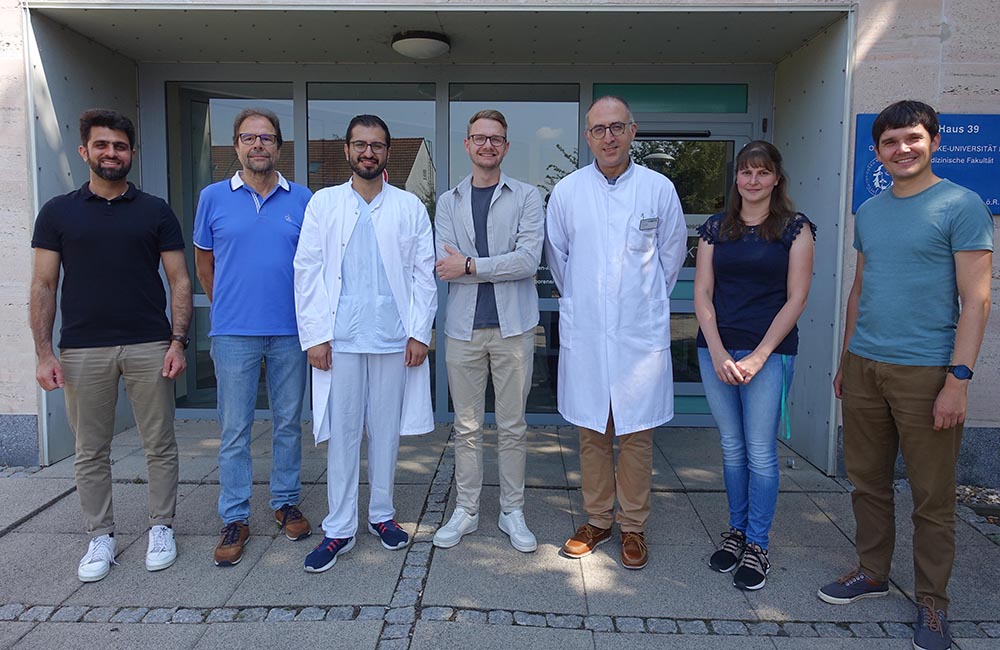Magdeburg cancer researchers decode important switch between inflammation and blood cancer
A team from the Department of Haematology at Magdeburg University Hospital has made a groundbreaking discovery that could revolutionise our current understanding of inflammation and blood cancer. The research team led by Professors Dr Thomas Fischer and Dr Dimitrios Mougiakakos from the Department of Haematology, Oncology and Cell Therapy at Otto von Guericke University Magdeburg has identified the role of blood defence cells, known as granulocytes, as mediators of strong inflammatory reactions in certain forms of blood cancer. The results deciphering this important switchboard have been published in the renowned Journal of Hematology and Oncology and open up new possibilities for improved therapeutic approaches.
Inflammatory reactions occur particularly in patients with myeloproliferative neoplasms (MPN), which include polycythaemia vera, essential thrombocytosis and myelofibrosis. MPN diseases are rare malignant blood diseases that are often accompanied by symptoms such as fever, excessive night sweats, unbearable itching and complications such as thromboses and strokes. Until now, the causes of these inflammatory reactions and complications were insufficiently understood.
In the current study, the scientists led by first authors Dr Ronny Haage and Manos Charakopoulos investigated the molecular changes that manipulate granulocytes in such a way that they produce more pro-inflammatory messenger substances such as interleukin-1 (IL-1) and the metabolism of the granulocytes is altered. ‘What was particularly interesting was the discovery that the granulocytes are modified in such a way that they adhere more strongly to the vessel walls. This increased stickiness of the granulocytes contributes significantly to the formation of thromboses,’ explains Professor Fischer, head of the “Inflammation in MPN” research group at Magdeburg University Hospital.

Photo from left to right: The Magdeburg research team: Dr Vikas Bhuria, Prof Thomas Fischer, Manos Charakopoulos, Dr Ronny Haage, Prof Dimitrios Mougiakakos, Conny Baldauf, Dr Martin Böttcher. Photographer: Daniela Crasser
Another key finding from the study is that these changes in the granulocytes depend on genetic mutations in the haematopoietic stem cells. The mutations in the JAK2 kinase and calreticulin protein genes, which are detected in the majority of MPN patients, were analysed. As a next step, the research team plans to investigate the extent to which the new findings can be used in new treatment options for patients with MPN.
Professor Fischer emphasises: ‘The success of our study was made possible by the interdisciplinary collaboration at the GCI3 Health Campus of Magdeburg University Hospital and the CHAMP research centre at the University of Magdeburg. Here we were able to optimally combine the interfaces of haematology, immunology and cell biology with innovative microscopic imaging.’
The study was conducted in cooperation with the Hannover Medical School, the Helmholtz Centre for Infection Research Braunschweig, the German Cancer Research Centre Heidelberg and the University of Cambridge, Cambridge Stem Cell Institute.
Originalarbeit: Neutrophilen-spezifische Expression von JAK2-V617F oder CALRmut induziert unterschiedliche Entzündungsprofile bei myeloproliferativer Neoplasie, in: Journal of Hematology and Oncology (2024), DOI: 10.1186/s13045-024-01562-5
Scientific contact
Prof. Dr. med. Thomas Fischer, WG ‘Inflammation in MPN’, University Clinic for Haematology, Oncology and Cell Therapy, Otto-von-Guericke University Magdeburg, Tel.: +49-(0)391-67-21055, e-mail: thomas.fischer@med.ovgu.de






